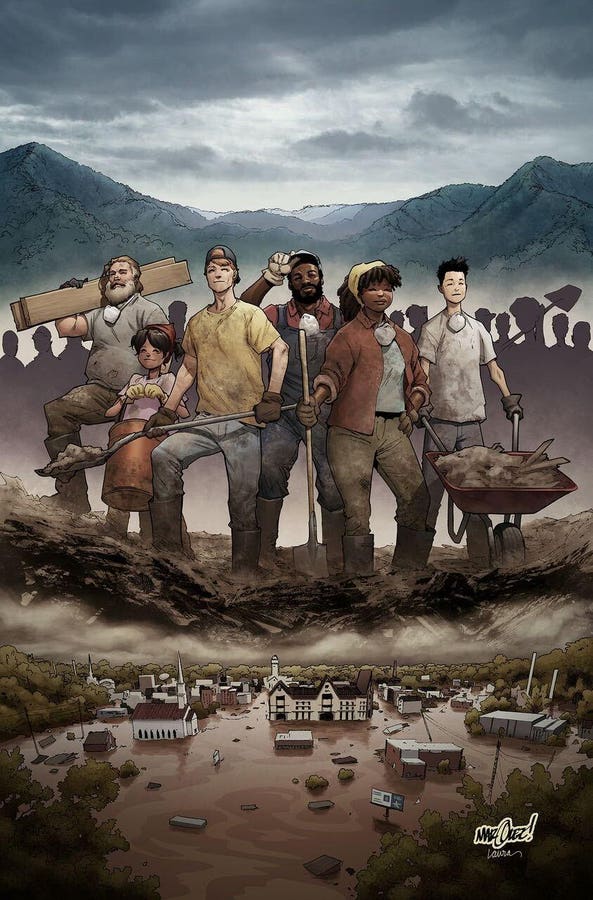Image from Islands in the Sky, part of the Appalachia Comics Project launched by Good Trouble, 2025.
Andrew Aydin, former congressional aide to the late Civil Rights icon Rep. John Lewis and coauthor of Lewis’s best-selling graphic memoir series March, also happens to be a proud third generation farmer in western North Carolina. Last year, his community was devastated by Hurricane Helene, which laid waste to swaths of Appalachia as it moved inland from the Gulf. As they are rebuilding, Aydin is launching a project to bring more attention and dispel myths about this unique region, using the medium of comics to uplift neglected voices and spur economic development.
“I live in Edneyville, one of the hardest hit areas,” said Aydin in an exclusive interview earlier this month. “There are towns here that were decimated. Roads, infrastructure destroyed. This entire part of the country was completely cut off from communication during the disaster.”
In this photo taken Jan. 15, 2015, Rep. John Lewis, D-Ga., left, and his co-author Andrew Aydin, … More
Aydin says it took extraordinary effort and a lot of luck to get the word out to federal authorities. The scope of the devastation brought attention to the rural and rustic regions of Appalachia, but also brought into focus longstanding preconceptions about the area’s poverty and insular culture.
Aydin, who has been publishing educational and issue-oriented comics through his company Good Trouble, saw an opportunity to address that through the power of a medium he knows well: comics. He has organized the Appalachia Comics Project, which he says aims to create a nonfiction graphic history of the Hurricane Helene disaster, partnering with area journalists, storytellers and artists to “reach an underserved – and often intentionally misunderstood – audience where the loss of local news infrastructure and institutions has led to rampant mis- and disinformation.”
“The TV, radio and print media here are owned by massive, agenda-driven corporations, but what the people around here read are the tiny, printed publications they pick up at the gas station,” Aydin said, because those stories authentically speak to and about their lives.
Aydin, who fought his own battles on Capitol Hill to get colleagues to respect the graphic novels he and Congressman Lewis were developing – books that went on to win a National Book Award and reach #1 on the New York Times Best Seller list – realized that the power of comics could benefit his new neighbors, both in the post-hurricane crisis and beyond.
“The people in this area love comics,” he said. “A lot of them have been reading them since they were kids. ACP gives them the opportunity to collaborate with the creators of some of their favorite stories and characters [including luminaries like Brian Michael Bendis, Keiron Gillen and Gene Yang]
. It’s not only going to be creatively fulfilling and a chance to make interesting stories, it will be kind of like therapy for everyone, to work out the trauma around everything that’s happened.”
The ACP’s goal is to raise approximately $400,000 to fund the production and distribution of the initial graphic history as well as an ongoing Appalachia Comics imprint, which would be distributed free to local bookstores, schools and public libraries. In addition to the Helene graphic history, the imprint will produce nonfiction and fictional stories based on Appalachian culture, including a quarterly 64-page comic blending folklore, history, fiction and nonfiction focused on environmental issues like agriculture, land and water management, and recipes, and a second title aimed at subverting stereotypes and delving into the real lives of mountain folk.
Aydin says he hopes the project will provide employment to survivors of the hurricane, creators and journalists, while bringing much-needed funds into the community. Eventually he said he would like to see it become a trusted, grass-roots alternative to the dominant media, which he says both condescends to the local culture and exploits it for political advantage.
“No one is valuing the culture of the working class people here who have carved out a living for hundreds of years in very difficult terrain,” he said. “The idea is that if we can tell stories made by the people who live here, it will help bridge that divide where people don’t automatically discount something because it’s from this region. The will see the value and learn from people who have devised all sorts of innovative, creative ways to survive.”
Aydin says recent events have made the project even more urgent and necessary, as the Trump administration recently denied North Carolina’s request for extended funding through FEMA. “The federal government is abandoning us, small businesses are shutting down, people are losing their jobs, tourist-based businesses are desperate for people to come visit. This is a way for us to tell our story in a creative, innovative way that helps local people, puts money in their pocket, and at the same time builds a greater understanding of why people in this region deserve our support.”
ASHEVILLE, NORTH CAROLINA – SEPTEMBER 28: Storm damage near the Biltmore Village in the aftermath of … More
Read the full article here
